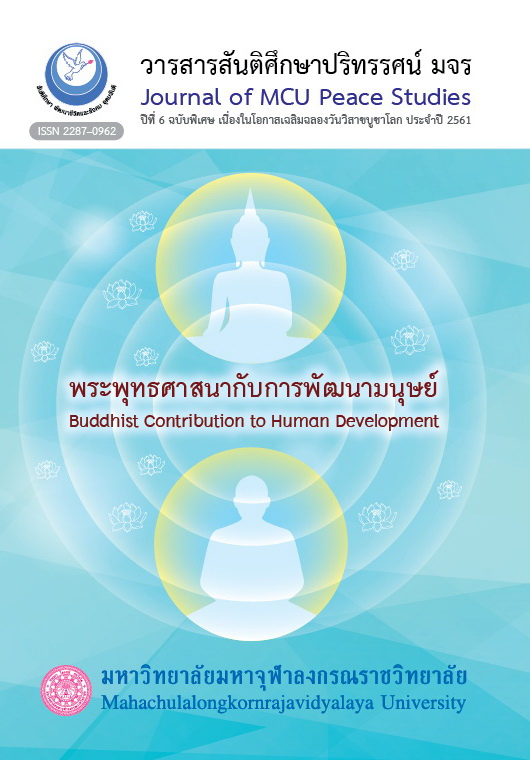An analytical study of Buddhist Ethics and Careers in Buddha’s time
Main Article Content
บทคัดย่อ
The research title “An analytical study of Buddhist Ethics and Careers in Buddha’s time” of which objectives are to study of the categories of the career in Buddha’s time, Buddhist ethical principles in careers and to apply the Buddhist ethical principles in careers development in the present. The methods of this research work are documentary study by searching the data focus on the concept of Buddhist Ethics and careers in Buddhism in Tipitaka, Commentaries, Sub-commentaries, related research works and analysisall data regarding the Buddhist ethics principles and careers
From the research, it is found that the kinds of various careers in Buddha time has evolved from the beginning of the absence of the cycle of existence of Aeon (Vivatta Kappa) which appears in AggannaSutta. The original occupation was agriculture, from agriculture was developed into industrial society. However, in Buddha time the castes system was strength of which affected to people and occupations. Whatever occupation the people did, it depends on the caste they belong to.
In the Buddhist ethical issue in occupations, it is found that the principles Buddhist ethics is based on His teaching of which the concept of “good or bad” “right or wrong” “should do or should not do” is absolute. When examined the aims, it can divide into two level, viz. 1) Mundane (Lokiya) means Buddhist principles for the house holders and 2) Super- mundane (Lokuttara) means the highest level of Buddhist principles for the noble persons (Ariyapuggala) who practice until getting the wisdom which can lead to destroy the defilement or the circle of birth absolutely. The Buddhist moral judgement is the norm to adjudicate the good or bad of human based on Wholesome actions- i.e. Non-greed (Alodha), Non-hatred (Adosa) and Non-delusion (Amoha), and Unwholesome action –i.e. Greed (Lobha), Hatred (Dosa) and Delusion (Moha) by consideration of the agent’s volition (Cetana) and fruit of Action.
In the issue concerning an application of Buddhist ethical principle in development of careers in present time, is found that careers in Buddha time was connected with religious belief –well-known as the castes –hence social system is not more complicated, while in the present time is more complex. As mentioned above, there are various careers which respond the demand of the people expanded. Then only Buddhist moral judgement which is major criteria to judge careers that “should do or should not do” “good or bad” may not enough, we have to use other criteria to judge i.e. minor criteria –consciousness – and participation criteria –law and code of profession, to find the way out for some careers in present time.
Article Details
ทัศนะและความคิดเห็นที่ปรากฏในบทความในวารสาร ถือเป็นความรับผิดชอบของผู้เขียนบทความนั้น และไม่ถือเป็นทัศนะและความรับผิดชอบของกองบรรณาธิการ ยินยอมว่าบทความเป็นลิขสิทธิ์ของวารสาร


